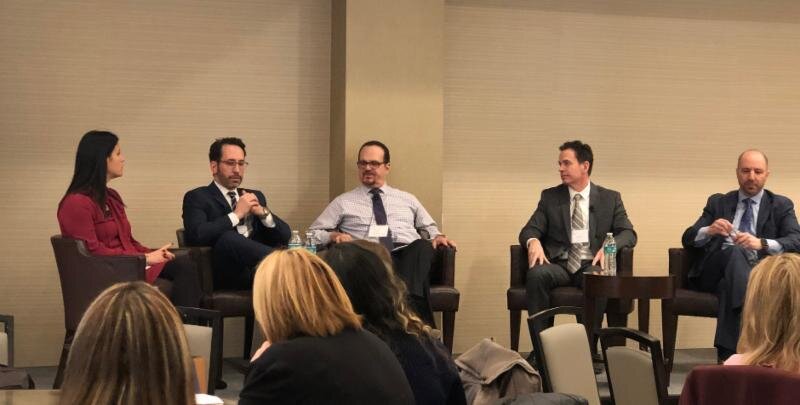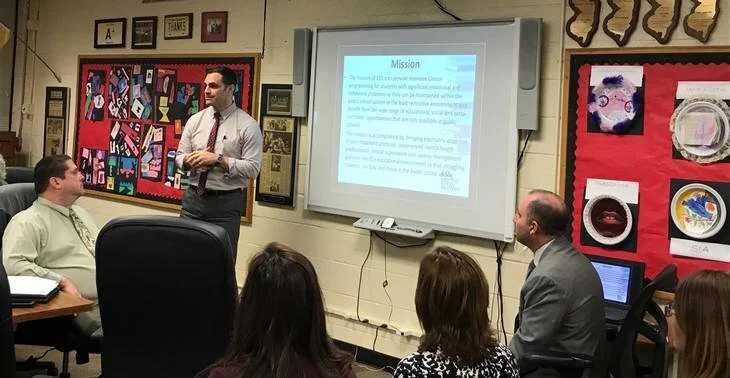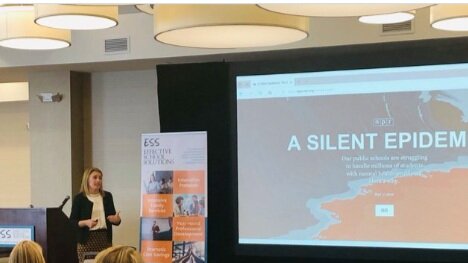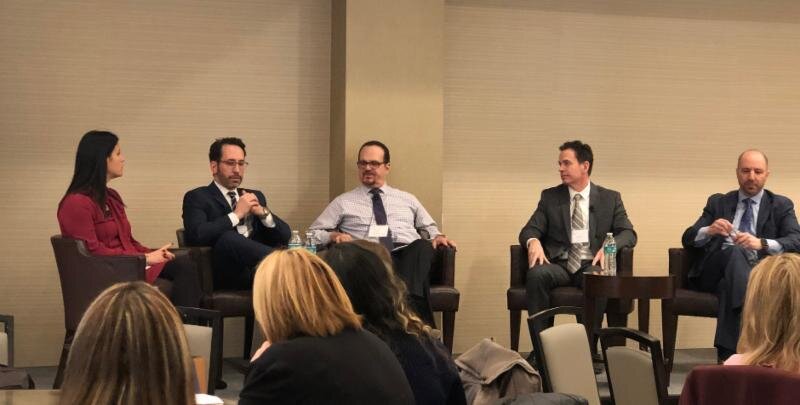
A panel of N.J .education leaders participated on a mental health leadership panel discussing best practice strategies that work, for community and stakeholder engagement. ,From left to right: Marta Audino (Hamilton), Dr. Rui Dionisio (Verona), Jerry Barone, Chief Clinical Officer, Effective School Solutions (Moderator),Dr. Rick Labbe (Sayreville), Nick Norcia (Fair Lawn)
A few years ago, NPR did a piece called “Mental Health in Schools: A Hidden Crisis Affecting Millions of Students.” They cited that “nearly 80% of kids who need mental health services don’t receive them. Experts say schools could play a role in identifying students with problems and helping them succeed. Yet it’s a role many schools are not prepared for.”
Most educators didn’t receive mental health training while studying to become teachers. And schools often lack resources, money and don’t have enough social workers and psychologists to meet the emotional needs of their students. But we need to help our children reach their full potential and prevent kids from falling through the cracks.

Jared DeLancey, Senior Director of District Partnerships at Effective School Solutions, at Fair Lawn Board of Education, Bergen County NJ
A new industry has emerged to address this problem. These companies are hired by the school district to run mental health programs for students who have emotional or behavioral disorders. These programs can work in concert with the school’s academics and be integrated into a student’s schedule. These services are offered to students as an in-house solution whereas before the only option may have been to send the student to an out of district placement.
One of the companies that spearheaded this movement ten years ago is Effective School Solutions (ESS). They currently run their programs in NJ, PA, CT, MA, and CA. Being a parent of a child who had school refusal and attended a therapeutic boarding school, I was very excited to learn that these programs existed.
Their most comprehensive program acts as a therapeutic school alongside the district’s regular school. They call it “embedded in-school clinical programming.” The kids who may take part in this program may have a diagnosis of OCD, an anxiety disorder, school avoidance, depression, or have autism spectrum disorder. Their emotional and behavioral disorders are interfering with their ability to access their education.
Gerard Barone, the Chief Clinical Officer and Alyssa Haley, Director of Quality Management at Effective School Solutions spent an hour with me discussing their programs. I was very eager to learn how they get their school avoidant kids back in the school building. Usually, Effective School Solutions will have space within the school building to run their classes and programs. They offer individual therapy, parent counseling, group counseling, and work closely with their student’s academic teachers and school child study teams. The kids are receiving these clinical services several times a week. A huge advantage over the usual once a week outpatient treatment. This also builds a level of trust, comfort, and support which is vital for a child’s therapeutic engagement.
Alyssa and Jerry told me about their specific protocols for school avoidant children. They include an initial 90 -120-minute assessment and evaluation with the child and parents. They utilize the School Refusal Assessment Scale (SRAS) to help find the function of their school avoidance. And from there, they tailor a plan for that specific child. They have clinical expertise as mental health care professionals to be able to provide treatment such as Cognitive Behavioral Therapy (CBT), Dialectical Behavioral Therapy (DBT), and exposure therapy. Their close partnerships with the parents, the school, and regular meetings about the student’s progress are also important factors.

Amy Kennedy, Education Director of The Kennedy Forum, talking at The Annual Mental Health Summit sponsored by Effective School Solutions
For school avoidance, the ESS clinicians can provide phone support to the student and family and if they need to go to a student’s home, they will do so. Students may need to slowly progress from their ESS classroom to include their academic classes again. The therapists utilize desensitization techniques which is a process that diminishes emotional responsiveness to a negative or aversive stimulus after repeated exposure to it. Each step of the way they have their social worker or therapist guiding them which is key to this type of therapy.
Jerry and Alyssa told me that they also utilize the Nurtured Heart approach which is an innovative program that builds self-esteem. Teachers and therapists recognize and vocalize the child’s positive attributes rather than the usual focus on all the things that they are doing wrong. The approach has produced great results helping to rebuild a child’s self-worth.
I have a friend with a child enrolled in their program and she told me how the program has changed his life. He was once suicidal and school avoidant but with help from the ESS program, he just graduated high school and got a scholarship to college. She also told me that his high school friends had no idea that he was an ESS student. Since they change classes and the services are built-in to the schedule as class periods, no one ever knew.





